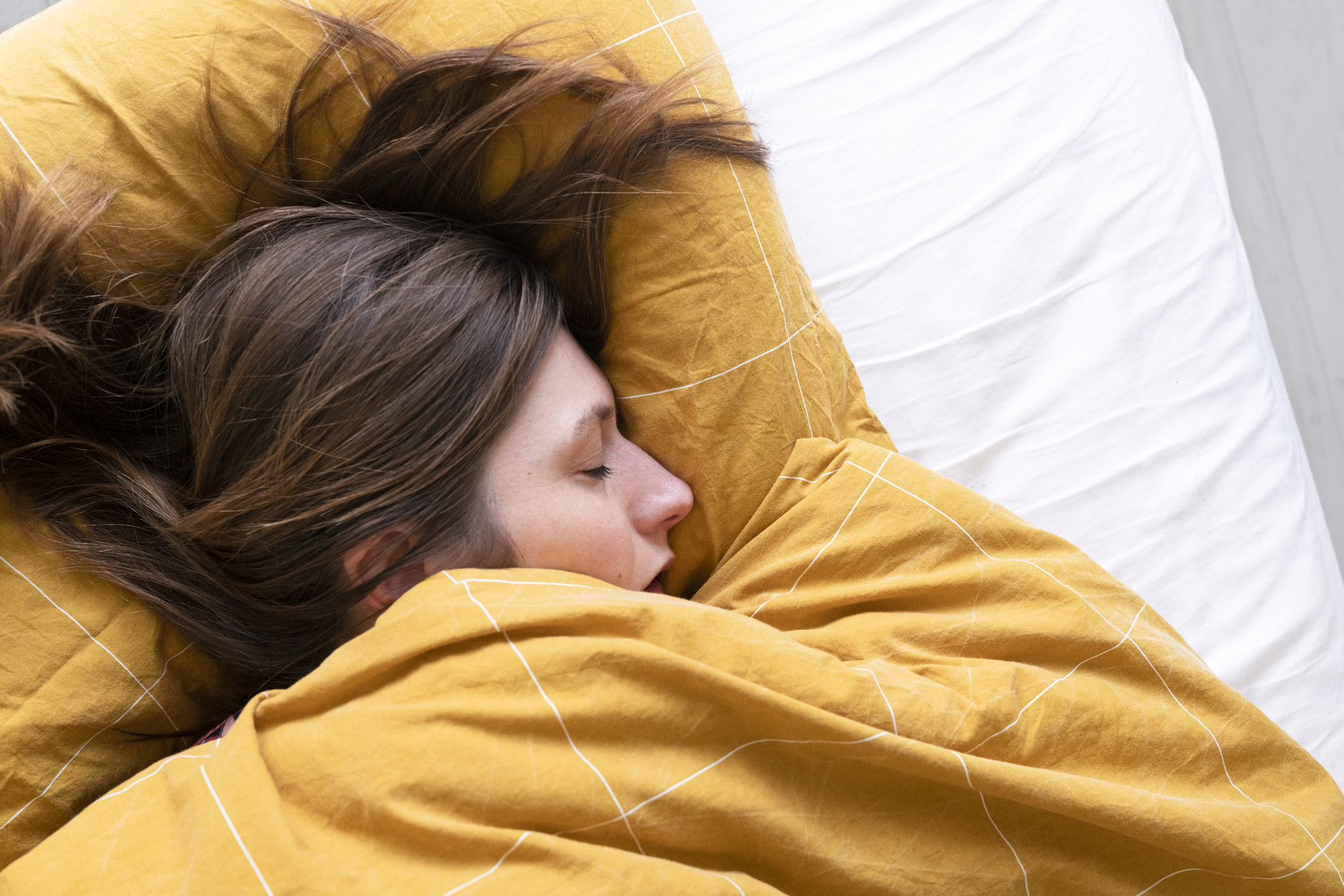
Celebrity news, beauty, fashion advice, and fascinating features, delivered straight to your inbox!
You are now subscribed
Your newsletter sign-up was successful
Are you clued up on the main norovirus symptoms? If the answer to that question is no, it might be about time to read up.
Just this week, Public Health England have warned about an outbreak of norovirus after a recent surge in cases. According to their stats, there's been a significant increase in cases across all age groups. Why? Well, many of you have spent the best part of sixteen months in lockdown, at home, meaning your immune system is weaker. That, combined with lockdown restrictions easing, seems to have resulted in a breeding ground for the bug.
According to the PHE figures, this year, in five weeks from June to July 2021, there were 154 norovirus outbreaks. Over the past five years, the same five week period has only ever seen an average of 53 cases, showing a significant increase.
Commonly known as the winter vomiting bug, the virus causes gastroenteritis and was first recognised by paediatrician Dr John Zahorsky in 1929. "However, it wasn't until 1972 that norovirus was discovered in a sample collected from children attending an elementary school in Norwalk, Ohio," explains doctor Robin Clark, Medical Director at Bupa UK Insurance.
We bought you guides to long Covid, morning sickness, and the many different types of headaches: shared expert-led explainers on feeling sick after sex, PTSD and hypochondria. Here, Clark breaks down the most common norovirus symptoms, plus tips on how to prevent the vomiting bug and what to do if you catch it.
Norovirus symptoms: 5 most common
FYI, norovirus is a highly contagious stomach bug that can be caught by coming into contact with someone (or thing) that has it, a little like coronavirus.
Norovirus symptoms tend to come on suddenly, and the most common are:
- Nausea
- Projectile vomiting
- Watery diarrhoea
- Tummy cramps
- Fever.
"For most people, having norovirus is unpleasant but generally mild," explains Clark. You'll usually make a full recovery in one to two days - although, do note that for vulnerable people – babies, older people and those with existing health problems – it can be more serious.
Celebrity news, beauty, fashion advice, and fascinating features, delivered straight to your inbox!
Do note here: if you already have a serious illness, or your symptoms carry on for more than three days or worsen, Clark advises you speak to your GP. "They’ll be able to give you advice about what to do and assess if you need further examination or treatment," he shares.
Look for signs of dehydration in children and the elderly, such as becoming lethargic or irritable. Nappies may be dry, or they may be urinating less. Seek urgent medical advice if you or someone you’re caring for shows signs of dehydration.

Norovirus treatment: 3 tips
So you've caught the bug and want to know how to ease your symptoms? Clark advises the following three simple steps.
1. Manage your symptoms
Stay home and near a toilet. Try and stay away from housemates or your partner, as the likelihood is, you'll infect them if you go too close. "The best thing you can do is try to manage your norovirus symptoms," Clark explains. One of the most important things to do is to rest, so do try and get some sleep, where possible.
2. Stay hydrated
One of the second most important thing is to drink lots of fluids to avoid dehydration. "Remember that it's key to replace the fluid you’re losing through vomiting and diarrhoea," explains Clark.
Do note that things like rehydration solution may help here, or adding a little salt to your water to make sure your electrolyte levels stay balanced. Raw ginger is also known to help settle the stomach.
3. Regularly wash your hands
If you already have the virus, not washing your hands shouldn't matter.. right?
Wrong. "Thoroughly washing your hands, especially after going to the toilet, changing nappies or before preparing food, is essential to prevent spreading the illness to others," explains Clark.
Do note: Don’t rely on alcohol gels, aka hand sanitisers, as these do not kill norovirus. The doctor advises that you always wash your hands with warm water and soap, and shares that liquid is better to use than bars of soap.
4. Disinfect surfaces
If you're worried you've got the vomiting bug, make sure you regularly clean hard surfaces in your home - such as door handles, taps and kitchen surfaces - with hot water, detergents, and disinfectant.
"Wash soiled clothes straightaway at 60 degrees or higher. This will reduce the risk of others coming into contact with the virus," Clark explains. "Don’t prepare food for other people until you’re fully recovered – at least 48 hours after your symptoms have gone away."
Read our guide to the best sustainable cleaning products, while you're here.
5. Stay home
If you think you’ve caught norovirus, it’s important not to visit hospitals, your GP surgery, family, friends, or relatives in care homes or other public spaces, Clark stresses.
"Just like with coronavirus, you could easily spread the infection to other people, and potentially to people who already have poor health or underlying conditions," he explains.
Bottom line, it's highly contagious, so you don’t want to risk passing it on to others, especially those that are vulnerable.

How to prevent yourself catching norovirus
1. Practice good hand hygiene
If you haven't got the message after it being repeated all year - remember hands, face, space? - then know this: hand washing is one of the most important things you can do to protect yourself and prevent the spread of viruses.
"Even if they look clean, your hands can still carry many germs, which is why cleaning hands regularly and effectively is so important," explains Clark.
Try this:
- Wet your hands under warm running water and apply a small amount of liquid soap to your hands.
- Rub your hands together vigorously.
- Make sure you apply soap and water to all surfaces of your hands for at least 20 seconds, and up to one minute.
- Dry your hands thoroughly once you’ve rinsed your hands.
2. Carefully prepare your food
FYI, one of the ways you can catch norovirus is by eating food that has been prepared by someone carrying the cirus. Clark's advice? Make sure that you rinse off all fresh fruits and vegetables before you eat them, and always cook your food thoroughly.
Top tip: "Ensure any shellfish you eat are cooked as well, because they can also transmit the virus due to how they're harvested and grown," the doctor shares.
3. Lead a healthy lifestyle
Keeping your immune system strong is a no-brainer if you're keen to avoid infection. A healthy immune system = better resources to fight incoming infections.
Try this: "Make sure you’re getting enough sleep, eating a healthy, balanced diet, exercising regularly, and reducing stress," he advises.
Bottom line?
If you think you might have norovirus, do seek medical support - virtually or over-the-phone, that is. They're best positioned to give you advice on how to treat your symptoms.

Ally is Marie Claire UK's Senior Health and Sustainability Editor, a well-regarded wellness expert, ten-time marathoner, and Boston Qualifying runner.
Utilising her impressive skillset and exceptional quality of writing, she pens investigative, review and first-person pieces that consistently demonstrate flair and originality.
As well as writing, Ally manages a team of freelancers, oversees all commissioning and strategy for her pillars, and spearheads the brand's annual Women in Sport covers, interviewing and shooting the likes of Mary Earps, Millie Bright, and Ilona Maher. Shortlisted for three BSMEs and winning one in 2022, Ally lives and breathes her verticals: her eye for a story and connections within the wellness sphere are unrivalled. Follow Ally on Instagram for more.
